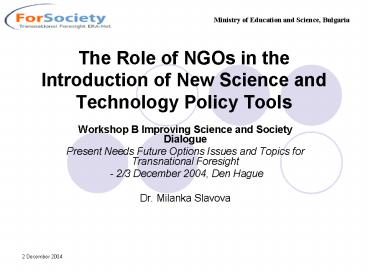The Role of NGOs in the Introduction of New Science and Technology Policy Tools - PowerPoint PPT Presentation
1 / 11
Title:
The Role of NGOs in the Introduction of New Science and Technology Policy Tools
Description:
The Role of NGOs in the Introduction of New Science and Technology Policy Tools ... Kristina Kadlecikova, Technology Centre AS CR, Czech Republic ... – PowerPoint PPT presentation
Number of Views:67
Avg rating:3.0/5.0
Title: The Role of NGOs in the Introduction of New Science and Technology Policy Tools
1
The Role of NGOs in the Introduction of New
Science and Technology Policy Tools
- Workshop B Improving Science and Society Dialogue
- Present Needs Future Options Issues and Topics
for Transnational Foresight - - 2/3 December 2004, Den Hague
- Dr. Milanka Slavova
2
Why Should We Discuss the Role of NGOs?
- Contemporary policy development should be based
on more participatory approach because of the
fact that knowledge is distributed widely and the
world goes more complex - Intelligence-gathering and networking methods
have to evolve - Foresight should reflect more democracy and less
elitism which means that more stakeholders have
to be involved in the Foresight exercises
3
Why Should We Discuss the Role of NGOs?
(continuation)
- NGOs provide means for expressing and actively
addressing the varied complex needs of the
society and help individuals to act as citizens - Free from the constraints of government and the
profit motive that dominates business, NGOs serve
as a forum for the discussion and dissemination
of new ideas, capacity building and testing of
new policy tools
4
Two Approaches towards NGOs Role
- NGOs as pioneers in the introduction of new
policy tools - foresight and regional innovation
strategies (RIS) - NGOs as participants in foresight exercises and
RIS development expressing the attitudes and
interests of civil society groups
5
NGOs as pioneers -1
- Foresight exercises were initiated by different
stakeholders - Government agencies Hungary (National
Committee for Technological development), the
Czech Republic (the Ministry of Education),
recently in Poland Ministry of Scientific
Research and Information Technology, In Slovakia
Ministry of Education and coordinated by the
Institute for Forecasting of the Slovak Academy
of Sciences - NGOs Bulgaria (ARC Fund), Romania (CRIMM)
in parallel with initiatives of the Academy of
Sciences in Estonia the Institute for Baltic
Studies - In Bulgaria, Romania, Estonia the pilot
foresight exercise initiatives were possible due
to the EU support - 5th framework programme
6
NGOs as pioneers - 2
- RIS - the initiative in many regions came from
national and regional NGOs - In some of the new member countries and the
candidate countries NGOs developed complementary
skills in policy development and innovation
support actions - TC AS in CR (host of the IRC, coordinator of a
RIS project and conducted the National Foresight) - ARC Fund host of the IRC, RIS for the South
Central region of Bulgaria, ForeTech Technology
Foresight pilot action for biotechnologies and
e-government services - CRIMM IRC, ForeTech biotechnology sector
- Institute for Baltic Studies IRC, RIS, eForesee
7
NGOs as representatives of the civil society
- NGOs were involved in Foresight and RIS in
different ways - In the coordination committee/board - in the
Czech Republic - In some of the panels or thematic groups - in the
Czech Republic, in Hungary environmental
organisations that opposed to the use of certain
energy sources in Bulgaria the Foundation for
Local Government Reform in the e-government panel - In the dissemination of the results and the
broader discussions in Hungary, the Czech
Republic, Bulgaria - Subcategories of NGOs professional and trade
associations and unions of research
organisations were the most active participants
8
Challenges for NGOs as pioneers
- To include the results into policy decision
making process - To develop cooperation between government and
pioneering NGOs in future activities - To combine the implementation of the Foresight
with other policy instruments
9
Challenges for NGOs as representatives of the
civil society
- To be involved in the foresight process in order
to broaden the discussion on ST from
non-research perspective - To raise their knowledge on Foresight and to
develop their skills in implementing foresight
tools in order to define their own future
activities
10
Acknowledgements
- Michael Keenan, PREST, UK
- Attila Havas, Institute of Economics, Hungarian
Academy of Sciences, Hungary - Kristina Kadlecikova, Technology Centre AS CR,
Czech Republic - Zoya Damianova, ARC Fund, Bulgaria
11
- Thank you































